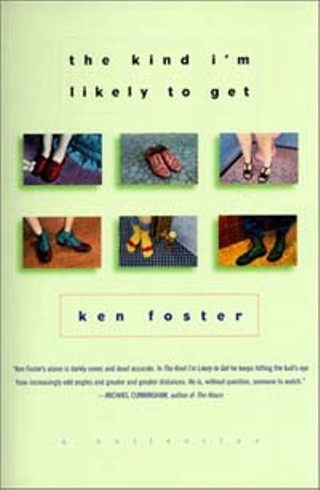Book Reviews
The Politics of Prose
By Barbara Strickland, Fri., Feb. 18, 2000

The Kind I'm Likely to Get: A Collection
by Ken FosterQuill, 208 pp., $12 (paper)
My stepfather said to me the other day about the American Northwest, "Well, it's okay. It rains a lot. Which is nice, if you like that sort of thing." The Kind I'm Likely to Get, Ken Foster's collection of short stories, is a little like my stepfather's version of Seattle. Foster is much better than okay, and his book is in several respects impressive; but if you aren't a dedicated fan of the slacker school of urban angst literature, then you may not like Foster's sort of thing.
The Kind I'm Likely to Get is full of gritty detail, from the rusty fire escape outside a male prostitute's apartment in "Two Windows" to the handgun that might belong to a lover in "Indelible." Apartments, office cubicles, chain bookstores, and laundromats are the backdrops for Foster's stories, and he describes them in a measured, cinéma vérité style that can either remind you of good Carver, or of some of the more affected late Nineties hipster novels, depending on the story.
The characters, too, are ambiguously familiar -- young urban drifters working slacker jobs and meandering through juiceless relationships while they contemplate the distance between potential and reality. Members of the TV generation, these characters are better acquainted with what emotion looks like than they are with how it feels. Foster sketches their hidden loneliness deftly. He touches on feelings that the characters themselves are barely aware of, and illustrates with occasionally cruel humor their self-absorption. These characters tend to be somewhat inert, the passive centers around which Foster's plots gradually, almost haphazardly, accrete.
The haphazardness is an illusion. The Kind I'm Likely to Get is artfully constructed. Foster interweaves third-person narratives featuring John, Mary, Kevin, and other recurring characters with stories told in disembodied first-person. The first-person stories, in which the characters are never named, enlarge upon themes of loneliness, homelessness and abandonment. The male prostitute, the paid companion taking care of a junkie movie star, the children hiding from their mother in the woods -- these characters speak from inside the pain that John, Mary, and Kevin often feel but refuse to recognize. This creates a sensation of movement missing in the individual stories.
Of course, the "modular" novel, composed of interlocking short stories and multiple points of view, isn't new. And within the stories themselves, the static nature of his characters and their surroundings proves to be limiting, since we catch only flashes of them and their development. But for the most part, Foster executes these set pieces well and to the limits of the form. It helps that he has a cool eye, a wit as dry as an empty vermouth bottle, and a talent for prose as sharp and uncompromising as broken glass.






